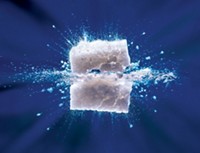Advertisement
Grab your lab coat. Let's get started
Welcome!
Welcome!
Create an account below to get 6 C&EN articles per month, receive newsletters and more - all free.
It seems this is your first time logging in online. Please enter the following information to continue.
As an ACS member you automatically get access to this site. All we need is few more details to create your reading experience.
Not you? Sign in with a different account.
Not you? Sign in with a different account.
ERROR 1
ERROR 1
ERROR 2
ERROR 2
ERROR 2
ERROR 2
ERROR 2
Password and Confirm password must match.
If you have an ACS member number, please enter it here so we can link this account to your membership. (optional)
ERROR 2
ACS values your privacy. By submitting your information, you are gaining access to C&EN and subscribing to our weekly newsletter. We use the information you provide to make your reading experience better, and we will never sell your data to third party members.
Environment
Sweet Nature
Cargill’s sugarlike truvia is made from a plant with a lot of history
by Melody Voith
July 28, 2008
| A version of this story appeared in
Volume 86, Issue 30

Sweetening foods and beverages is a tricky business, and the food industry has yet to find the perfect ingredient that consumers and nutritionists can agree on. But help may be coming in the form of a little South American shrub that made an appearance at last month’s International Food Technology conference in New Orleans.
Cargill’s Truvia joined a sweetness smackdown at the conference expo, where it was surrounded by its competitors. Meeting-goers sported bags emblazoned with the logo of Tate & Lyle’s Splenda, Chinese aspartame manufacturers showed off their low prices, and the Corn Refiners Association was on hand to defend the reputation of high-fructose corn syrup.
Truvia is the brand name for rebiana, a naturally derived zero-calorie sweetener that comes from the Stevia rebaudiana plant. The stevia plant has been used by the Guarani people of Paraguay to sweeten foods and beverages for more than 200 years. In Japan, consumers have been eating stevia since 1977, and it now accounts for 40% of that country’s low- and no-calorie sweetener consumption, according to Cargill.
But in addition to sweet flavor, most stevia extracts have a bitter aftertaste that some consumers find objectionable. So Cargill scientists looked more closely at the plant’s nine sweet-tasting steviol glycosides to find one with a cleaner taste profile. They settled on high-purity rebaudioside A, which the company plans to commercialize with partner Coca-Cola.
Cargill has big hopes for the small leaves. “Truvia is a breakthrough new ingredient,” says Marcelo Montero, president of Cargill Health & Nutrition. “This is a significant milestone for Cargill’s emerging zero-calorie sweetener business with applications across food, beverage, and tabletop products.”
Truvia starred in a media event on July 9, when Cargill set up a stevia greenhouse inside New York City’s Rockefeller Center to promote the new product. The event was timed to coincide with the retail launch of Truvia packets.
The extract is also the focus of an entire supplement to the July issue of the journal Food & Chemical Toxicology. In one of the articles (46, S75), scientists from Cargill and Coca-Cola outline the sweetener’s structure, manufacturing process, and possible food applications, presumably including a well-known cola beverage. Other contributions focus on toxicity and health studies.
To obtain rebiana from the stevia leaves, Cargill uses a hot-water extraction process. Other plant components are removed by flocculation. The remaining solution is concentrated and eluted with alcohol. In a final step, the dried, mixed steviol glycosides are further purified and crystallized into a form that is 97% rebaudioside A.
Cargill scientists are confident in the safety of their new product. Yet in spite of their several-decade history of use, stevia-based sweeteners have had a tough time gaining Food & Drug Administration approval for use as a food additive in the U.S. Stevia products have been approved since 1995, however, for use as a nutritional supplement, which is what the new Truvia packets are considered. Cargill would not comment on the status of FDA applications for Truvia.
Safety issues aside, rebaudioside A falls short of being a perfect sweetener. The reports in the food journal say that at high concentrations it elicits a bitter, licorice-like aftertaste and so must be used in smaller amounts or combined with sweeteners such as aspartame, sucrose, or corn syrup. On the plus side, rebaudioside A retains its sweet taste longer than other sweeteners.
The Natural Marketing Institute (NMI), a health and wellness consulting firm based in Harleysville, Pa., has surveyed consumers about what they look for in a sweetener. According to Gregory J. Stephens, vice president of strategic consulting, “Natural sweeteners are certainly a trend that we picked up in the 2007 survey.”
NMI data suggest that the public may embrace a product like Truvia, once it’s shown to be safe. According to the survey, 28% of U.S. adults report they would prefer all-natural noncaloric sweeteners over artificial sweeteners, and just under half say they would be happy to give up products containing high-fructose corn syrup if a better sweetener were available.
- » Food Makers Follow Their Hearts
- Omega-3 fish oils and plant sterols star at food tech show
- » Sweet Nature
- Cargill’s sugarlike truvia is made from a plant with a lot of history
- » An Appetite For Science
- For Food Network host Alton Brown, science plays more than a cameo role
- » Sugar-Coated Science
- Cooking and comedy combine for some sweet results






Join the conversation
Contact the reporter
Submit a Letter to the Editor for publication
Engage with us on Twitter